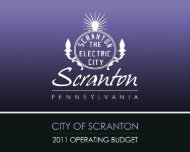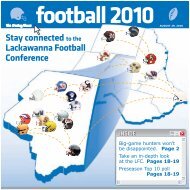racetracks
I want to be left alone! - The Times-Tribune
I want to be left alone! - The Times-Tribune
- No tags were found...
You also want an ePaper? Increase the reach of your titles
YUMPU automatically turns print PDFs into web optimized ePapers that Google loves.
30 • NORTHEAST PENNSYLVANIA BUSINESS JOURNAL • SEPTEMBER 2003<br />
Horses, slots create ‘racinos’<br />
‘Racinos’ could provide ‘destination entertainment’ venues at<br />
existing race tracks, benefit ancillary businesses<br />
Continued from page one<br />
a race track, which ultimately reduced the<br />
daily income at the track and made it more<br />
difficult to run a racing operation. Smaller<br />
and smaller crowds eventually took their<br />
toll on the breeding industry as well, with<br />
the reduction of purses to the horsemen,”<br />
said Dissinger.<br />
In the early 1980s,Atlantic City took a<br />
swing at the gaming industry.Their success<br />
was followed by riverboat gaming and<br />
large-scale gaming developments by the<br />
Native Americans across the country, all of<br />
which also contributed to a further decline<br />
in revenue on the horse racing scene,<br />
according to Dissinger.<br />
“In the late 1980s, the introduction of<br />
interstate simulcasting allowed more<br />
opportunity to increase revenue for the<br />
horse racing industry. (But) that is still not<br />
enough,” said Dissinger.<br />
More needs to be done, he said, to save<br />
the sport and business of horse racing —<br />
currently valued at $1.4 billion in<br />
Pennsylvania as reported by the<br />
Pennsylvania Department of Agriculture<br />
this past June.<br />
The Tomlinson Bill is aimed at offsetting<br />
the state’s current budget deficit by introducing<br />
a new gaming market while preserving<br />
the horseracing industry.<br />
The combination of the two industries is<br />
anticipated to bring about other positive<br />
impacts on regional economic development<br />
through the expansion of hotels,<br />
restaurants, and other businesses that will<br />
benefit from an influx of visitors.<br />
According to Ewing Cole,“In order to<br />
accomplish this, integrated racing and<br />
gaming destination entertainment developments<br />
should be strategically located<br />
around the state to maximize the ultimate<br />
revenue potential in a region. Care<br />
should be given to identify locations<br />
that can capture revenues outside the<br />
borders of Pennsylvania.”<br />
“The racing venue must become part of a<br />
larger complex,” said Dissinger.<br />
Successful “destination entertainment”<br />
venues must be developed with a more<br />
comprehensive view that capitalizes on<br />
multiple revenue generators.<br />
“This includes interactive attractions,<br />
game arcades,‘eater’tainment,’ specialty<br />
retail, museum attractions, sports bars, hotel<br />
and conference faculties, and luxury spas.<br />
The overall goal is to maximize revenue by<br />
increasing patron length of stay and repeat<br />
visitation while enhancing the overall visitor<br />
experience,”Ewing Cole notes.<br />
“Legislation has stalled over the summer<br />
as proponents of the various gaming bills<br />
attempt to find agreement on the best plan<br />
for the state,”said Dissinger.<br />
The legislative debate centers around an<br />
important issue: to only introduce slot<br />
machines at existing, state-licensed <strong>racetracks</strong><br />
and a few future ones and, in addition,<br />
to allow land-based faculties in<br />
urban areas.“The goal of this legislative<br />
initiative is twofold: add additional<br />
income to the state treasury through the<br />
taxation of additional gaming revenues,<br />
Gambling: the pros and cons<br />
PRO:<br />
Members of Bring Our Taxes Home (BOTH) support<br />
placement of slot machines at Pennsylvania's<br />
licensed standardbred and thoroughbred <strong>racetracks</strong><br />
“because of the revenues it will generate for<br />
state and local governments, for the jobs it will<br />
save and the new ones it will create and for bolstering<br />
Pennsylvania's sagging racing heritage.”<br />
BOTH members argue that this can be done simply<br />
by bringing home dollars now spent by<br />
Pennsylvanians on slot machines in neighboring<br />
states. Their argument:<br />
WHERE PENNSYLVANIANS GO TO GAMBLE<br />
Pennsylvanians made 9.6 million trips to gamble<br />
out of state in 2001 (That's an average of 26,200<br />
trips a day)<br />
■ Twenty-five percent of monies wagered in<br />
Atlantic City come from Pennsylvania (Pennsylvanians<br />
made 2.9 million day trips and 4.3 million<br />
overnight visits to Atlantic City in 2001 and spent<br />
$2.88 billion).<br />
■ Pennsylvanians made 575,000 trips to Las<br />
Vegas in 2001 and spent $349 million there<br />
■ Forty percent of monies wagered in DE come<br />
from Pennsylvania.<br />
■ Twenty-five percent of monies wagered in West<br />
Virginia comes from Pennsylvania.<br />
■ Additional Pennsylvanians wager in New York,<br />
Connecticut, Canada.<br />
This adds up to a staggering $3.2 billion of<br />
Pennsylvania dollars spent (left behind) in those<br />
states. Most (80 percent) is spent on slot<br />
machines. And this doesn't include an additional<br />
$1.5 billion in non-gambling expenditures while in<br />
those states like lodging, retail, entertainment,<br />
food and beverage, transportation.<br />
(Sources: Atlantic City Visitor Profile - 1998<br />
Final Report, Plog Research, Inc.; Profile of the<br />
American Casino Gambler, Harrah's<br />
Entertainment, Inc., 2002; International Gaming<br />
& Wagering Business, September 2002; Las<br />
Vegas Visitor Profile - Fiscal Year 2001 Annual<br />
Report, GLS Research; Las Vegas Convention And<br />
Visitors Authority Research Dept, 2002; Atlantic<br />
City Convention & Visitors Authority Research<br />
Department; Christiansen Capital Advisers)<br />
CON:<br />
Citizens for a Stronger Pennsylvania (CSP) is a<br />
campaign by Pennsylvanians Against Gambling<br />
Expansion (PAGE), No Dice, and other Pennsylvanians<br />
to prevent the introduction of various forms of casino<br />
gambling, including slot machines, riverboat gambling<br />
and video poker. CSP’s argument:<br />
IOWA — Problem gambling has more than tripled<br />
since casinos opened, with rates rising from 1.7 percent<br />
to 5.4 percent of all adults, said a 1995 statesponsored<br />
survey. A similar jump in Pennsylvania<br />
(which has about 8.4 million adults) would mean over<br />
300,000 new problem gamblers.<br />
ILLINOIS — Gov. Jim Edgar admitted riverboat gambling<br />
“hasn’t increased tourism or generated new<br />
income.” The state’s Economic and Fiscal<br />
Commission found little evidence of spinoff benefits,<br />
and an independent study in June 1996 estimated<br />
the casinos actually produce $239 million per year in<br />
net losses for local economies — even counting tax<br />
revenues as gains.<br />
MINNESOTA — The state’s Restaurant and Hotel<br />
Association reported business down 20 percent to 50<br />
percent at establishments near Indian casinos.<br />
Gambling-related personal bankruptcies have soared<br />
to an estimated 1,000+ per year, and a state that<br />
previously had just one Gamblers Anonymous chapter<br />
now has 53.<br />
WISCONSIN — A 1995 survey of customers at<br />
Indian casinos found: “More than 10 percent of the<br />
locals would spend more on groceries if it were not<br />
for the casino, while nearly one-fourth would spend<br />
more on clothes. 37 percent said that their savings<br />
had been reduced.”<br />
LOUISIANA — Political scandals and organizedcrime<br />
raids led gubernatorial candidate Phil Preis to<br />
joke in 1995, “The only growth industry we’ve got<br />
right now is the FBI.” Other negatives include a “very<br />
high” 7 percent problem gambling rate, and a study<br />
showing that riverboat casinos drained $102 million<br />
from the metro New Orleans economy through 1994.<br />
MISSISSIPPI — Thefts and other crimes roughly<br />
doubled in the towns of Gulfport and Bay St. Louis<br />
after casinos opened. In Biloxi, divorces rose 250<br />
percent, crisis calls to a local women’s shelter doubled,<br />
and total violent crimes rose from 5,072<br />
Above are two views of the proposed “Freedom Park,” a “racino” to be located off Route<br />
33 in Palmer Township, provided it gets slots and a state license. According to the<br />
Allentown Morning Call, “other major players are looking to snare an available<br />
Pennsylvania license.” Churchill Downs is backing plans for “Pittsburgh Palisades Park,”<br />
a $500 million racetrack-casino-retail development. Magna Entertainment, a Canadian<br />
company, proposes to build a thoroughbred track near Pittsburgh International Airport.<br />
Edson Arneault, who operates a gaming resort in West Virginia, has pledged to donate<br />
$60 million to build a hockey arena for the Pittsburgh Penguins if Pennsylvania gives him<br />
a racetrack license. Rendering courtesy of Ewing Cole Cherry Brott<br />
while enhancing horse racing,”he added.<br />
Advocates of the bill want to retain<br />
Pennsylvania’s fair share of the gaming<br />
economy that has expanded significantly<br />
over the last several years in such places as<br />
Atlantic City and other states ,like West<br />
Virginia and New York, which have recently<br />
incidents in 1993 to 7,413 in 1994.<br />
NEVADA — With over 300 casinos, Nevada consistently<br />
ranks at or near the top among all states in per<br />
capita suicide rate, incarceration rate, high school<br />
dropout rate, deaths per vehicle mile, and child death<br />
by abuse.<br />
NATIONWIDE — US News & World Report (Jan. 15,<br />
1996) computer-analyzed data from casino areas<br />
across the country. In terms of economic growth, the<br />
magazine found no significant difference between<br />
casino areas and the rest of the US. But crime rates<br />
in casino areas were nearly twice as high — 1,092<br />
incidents per 10,000 population vs. 593 — and<br />
approved slots at <strong>racetracks</strong>.<br />
Those against the bill deem it “illegal<br />
and immoral,” saying it creates a potential<br />
for addiction, but proponents say it’s just<br />
another form of entertainment — one<br />
from which Pennsylvania has an opportunity<br />
to benefit.<br />
“towns with casinos have experienced an upsurge of<br />
crime at the same time it was dropping for the nation<br />
as a whole.”<br />
A final note: Ten years ago, problem gambling<br />
among teenagers in the United States was considered<br />
a rarity. In 1995 about 12 percent of the calls to<br />
the nationwide 1-800-GAMBLER helpline involved people<br />
under 21.<br />
(Sources not cited nor taken from public records: Edgar quote, Chicago<br />
Tribune. Illinois study, Better Government Association of Chicago. Minnesota<br />
figures, Minneapolis-St. Paul Star Tribune. Wisconsin survey, Wisconsin<br />
Policy Research Institute. New Orleans study, Policy & Management<br />
Associates for URA of Pittsburgh.)<br />
TGI Friday’s benefits raise money for Make-a-Wish<br />
A check for $20,000 was presented to the Make-A-Wish Foundation of Northeast PA<br />
from money raised at the Wilkes-Barre, Williamsport and Quakertown TGI Friday’s<br />
Bartender Challenges and also at a recent benefit golf outing. From left to right are<br />
Andy Sweitzer, general manager, TGI Friday’s; Jeffrey Metz, vice president of operations,<br />
TGI Friday’s; Art Owens, director of program services, Make-A-Wish<br />
Foundation; and Jessie Hardy, president and CEO, Make-A-Wish.




